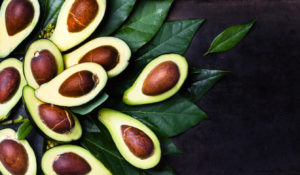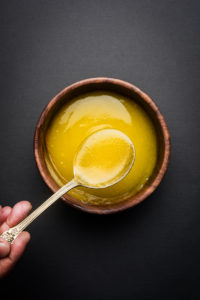Cooking with Healthy Fats
In this post I’ll outline the harm that refined vegetable oils wreak on our health, and then talk about some of the healthier fats and oils that we use for cooking at VITA kitchen.
Why we don’t use canola oil, or other refined vegetable oils…
In the restaurant and catering industry canola oil (or a canola oil blend) is the ubiquitous oil for high heat cooking. It’s lack of strong flavor, high smoke point, low price point, and absence of allergens is the reason for its widespread use. For most of my cooking career canola oil was just the way it was — it even came across as a healthier choice than other options.
It was on a podcast with doctor Cate Shanahan, the author of the book Deep Nutrition, that I was first turned on to the dangers of consuming canola oil, along with other refined vegetable oils.
Canola oil belongs to the family of refined vegetable oils — oils made of grains and seeds. This family includes sunflower, safflower, corn, soybean, peanut, rice bran and grape seed oil. All of these oils are high in omega-6 fatty acids — and while it is true that omega-6 fatty acids are essential for our health — the problem is that these omega-6s are also extremely vulnerable to oxidation.
When these polyunsaturated fats appear in their natural, whole state — in grains and seeds — they are bundled with antioxidants. But when the oils undergo the heat and chemical processing required to make them into oil they lose that antioxidant protection. Oxidation leads to the production of free radicals, which in the body leads to inflammation and damage to our cellular structures, including our own DNA. We want to keep our bodies as inflammation free as possible, to avoid future health complications and to keep our genetic code — our DNA — in prime condition!

Now let’s move on to healthy fats for cooking…
So now that we know refined vegetable oils are bad, let’s get to the good stuff. If the term healthy fats seems like an oxymoron to you, you’re probably not alone, For a long time in the 70s, 80s, and 90s fats were demonized, and the low-fat movement were born. Luckily we’ve made it out of that for the most part, and nutritionists unilaterally agree that our bodies need fat to function properly, especially our brains which are made of 60% fat.
While the end of the low-fat movement is a big step forward, the conversation has not yet shifted to what fats we should be consuming, and what fats we should be cooking with.
The thing to consider about cooking oils is smoke point, the temperature at which point the oil will start visibly smoking in the pan. At this smoke point the structure of the oil is starting to break down, and those harmful free radicals are created. Even a healthy oil, like olive oil, can become dangerous when used at high temperatures.
At VITA kitchen we use different oils for high and temp cooking.
LOW TEMPERATURE COOKING
Extra Virgin Olive Oil
The hype is real about olive oil. Extra virgin olive oil really is phenomenal for your health. This is mostly due to the high levels of oleocanthol – a powerful plant compound that stimulates our bodies own repair mechanisms. It is extremely anti-inflammatory, and has been shown to protect the brain against cognitive decline.
When choosing olive oils you want to taste the peppery, or “spicy” quality in the back of your throat. That spicy flavor is actually that oleocanthol.
The caveat about olive oil is that it is not great for high temperature cooking. It is prone to oxidation at high temps, and looses those amazing health qualities I mentioned above. I use olive oil for all non-heat applications (i.e. salad dressings, pestos, salsas), low temp sous vide cooking, and to finish dishes with a drizzle after cooking.
Butter
For people who are okay with consuming dairy butter is a great low-temp cooking fat — especially when sourced from grass-fed cows, making it rich in omega 3 fatty acids.
Coconut oil
Since we use virgin coconut oil we don’t use it for high temp cooking. It is good for baking purposes, as well as for lower temp sautés. Refined coconut oil can be used for higher temp cooking, but lacks a lot of the same nutritional content (namely the medium chain triglycerides, or MCTs).
Nut oils
For people who don’t express allergens to nuts, nut oils like walnut, macadamia, pumpkin seed oil and hazelnut are also great to incorporate into your diet. Walnuts are great for an extra boost of omega 3s, while oils like hazelnut are high in Vitamin E. We like to use these oils sparingly where appropriate — drizzled on top of salads, incorporated into a pesto, etc. We NEVER cook with them, with the exception of macadamia nut oil, which remains stable at higher temperatures.

HIGH TEMPERATURE COOKING (basically anything above 200 degrees)
Avocado oil
This is our go-to oil for high temperature cooking, like roasting, pan searing and other applications. The oil remains stable at high heat, and imparts little flavor to the food. Plus we live, and cook, in the magical state of California where avocados are plentiful!
Ghee
Once the milk solids have been taken out of butter, you have ghee. Ghee actually has a very high smoke point, and this is what makes it okay for cooking at high temperature. Again we use ghee sourced from grass-fed cows.
Animal fat
During the low-fat craze our country was afraid of saturated fats. These are the fats that come from animals and dairy, and they were thought to be the cause of heart disease. More recent research shows that this is simply not the case. There is a much stronger linkage between sugar and refined carbohydrate consumption and heart disease, then saturated fat consumption and heart disease. Animal fat consumption has been a norm in many parts of the world throughout human history, and we have only seen the rise in heart disease among humans over the past fifety years or so.
For our non-vegetarian clients we use animal fats for cooking sometimes — primarily rendered pork, chicken (schmaltz), and duck fat— when the flavor is appropriate. The high smoke point makes them ideal for browning meats, and they also go fantastic with heartier fall/winter dishes like roasted potatoes.
Please don’t hesitate to reach out if you have any questions surrounding cooking oils.
And remember, it’s not the AMOUNT of fat you consume, it’s the TYPE of fat you consume that matters!
______________
Sources:
Luguvare, Max. Genius Foods. New York: Harper Collins, 2018. Print.
Shanahan, Catherine M.D. Deep Nutrition. New York: Flatiron Books, 2016. Print.

